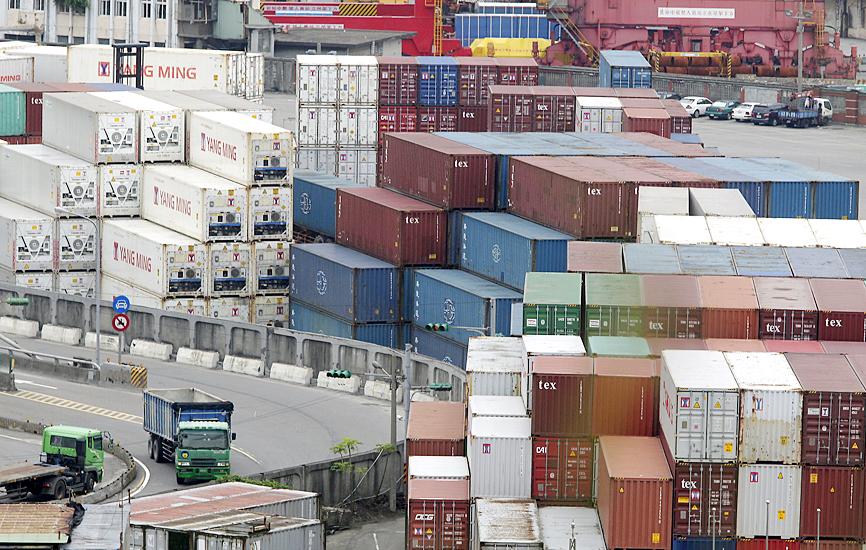Taiwan’s exports last month jumped 34.7 percent year-on-year to a record US$37.95 billion as global demand for tech and non-tech products remained solid, the Ministry of Finance said yesterday.
The momentum is expected to continue this month with an estimated gain of 20 to 25 percent, despite a high comparison base last year, Department of Statistics Director-General Beatrice Tsai (蔡美娜) told an online news conference in Taipei.
“We have observed a strong and broad-based pickup of tech and non-tech shipments for quite a while,” Tsai said.

Photo: Reuters
The embrace of digital transformation by global companies and organizations fueled insatiable demand for chips and other electronics, while a warming global economy powered demand for base metal, plastic, chemical and mineral products, Tsai said.
Next-generation smartphones and other consumer electronic gadgets would ramp up business at local component suppliers and push up their selling prices, she said.
Apple Inc is widely expected to release new iPhones and Apple watches next month to capitalize on the back-to-school and Christmas seasons, and rival brands are unlikely to sit on the sidelines.
That would continue to benefit the nation’s exports, although the pace of increase might slow a bit due to a high comparison base this month, Tsai said, adding that the trajectory would not veer off course despite lingering uncertainty.
The Delta variant of SARS-CoV-2 is spreading worldwide, but US and European authorities have said that they are not planning to consider lockdowns, because many people have been vaccinated.
Shipments to all major trading partners posted double-digit percentage growth, led by a 64 percent surge to Europe, the fastest increase in history, the ministry’s report said.
Exports of optical devices — mainly flat panels and phone camera lenses — lost some steam, but still rose 18.9 percent, although analysts have projected a slowdown.
The low comparison base last year enabled shipments of metal, plastic, chemical and mineral products to report improvements of 40 to 114 percent, while electronics commanded much higher absolute values, Tsai said.
Imports advanced 41 percent year-on-year to US$32.05 billion last month, giving Taiwan a trade surplus of US$5.9 billion for the month, the ministry said.
Imports of agricultural and industrial materials accounted for the majority at 69.8 percent, while local semiconductor firms aggressively acquired capital equipment to expand capacity and ease chip supply crunches, it said.
Imports of semiconductor capital equipment swelled 69 percent to US$2.71 billion, it said.
For the first seven months of the year, cumulative exports expanded 31.5 percent to US$58.72 billion, while imports grew 30.4 percent to US$20.71 billion, it said.

MAKING WAVES: China’s maritime militia could become a nontraditional threat in war, clogging up shipping lanes to prevent US or Japanese intervention, a report said About 1,900 Chinese ships flying flags of convenience and fishing vessels that participated in China’s military exercises around Taiwan last month and in January last year have been listed for monitoring, Coast Guard Administration (CGA) Deputy Director-General Hsieh Ching-chin (謝慶欽) said yesterday. Following amendments to the Commercial Port Act (商港法) and the Law of Ships (船舶法) last month, the CGA can designate possible berthing areas or deny ports of call for vessels suspected of loitering around areas where undersea cables can be accessed, Oceans Affairs Council Minister Kuan Bi-ling (管碧玲) said. The list of suspected ships, originally 300, had risen to about

DAREDEVIL: Honnold said it had always been a dream of his to climb Taipei 101, while a Netflix producer said the skyscraper was ‘a real icon of this country’ US climber Alex Honnold yesterday took on Taiwan’s tallest building, becoming the first person to scale Taipei 101 without a rope, harness or safety net. Hundreds of spectators gathered at the base of the 101-story skyscraper to watch Honnold, 40, embark on his daredevil feat, which was also broadcast live on Netflix. Dressed in a red T-shirt and yellow custom-made climbing shoes, Honnold swiftly moved up the southeast face of the glass and steel building. At one point, he stepped onto a platform midway up to wave down at fans and onlookers who were taking photos. People watching from inside

Japan’s strategic alliance with the US would collapse if Tokyo were to turn away from a conflict in Taiwan, Japanese Prime Minister Sanae Takaichi said yesterday, but distanced herself from previous comments that suggested a possible military response in such an event. Takaichi expressed her latest views on a nationally broadcast TV program late on Monday, where an opposition party leader criticized her for igniting tensions with China with the earlier remarks. Ties between Japan and China have sunk to the worst level in years after Takaichi said in November that a hypothetical Chinese attack on Taiwan could bring about a Japanese

STREAMLINED: The dedicated funding would allow the US to transfer equipment to Taiwan when needed and order upgraded replacements for stockpiles, a source said The US House of Representatives on Thursday passed a defense appropriations bill totaling US$838.7 billion, of which US$1 billion is to be allocated to reinforcing security cooperation with Taiwan and US$150 million to replace defense articles provided to the nation. These are part of the Consolidated Appropriation Act, which the US House yesterday passed with 341 votes in favor and 88 against. The act must be passed by the US Senate before Friday next week to avoid another government shutdown. The US House Committee on Appropriations on Monday unveiled the act, saying that it allocates US$1 billion for the Taiwan Security Cooperation Initiative